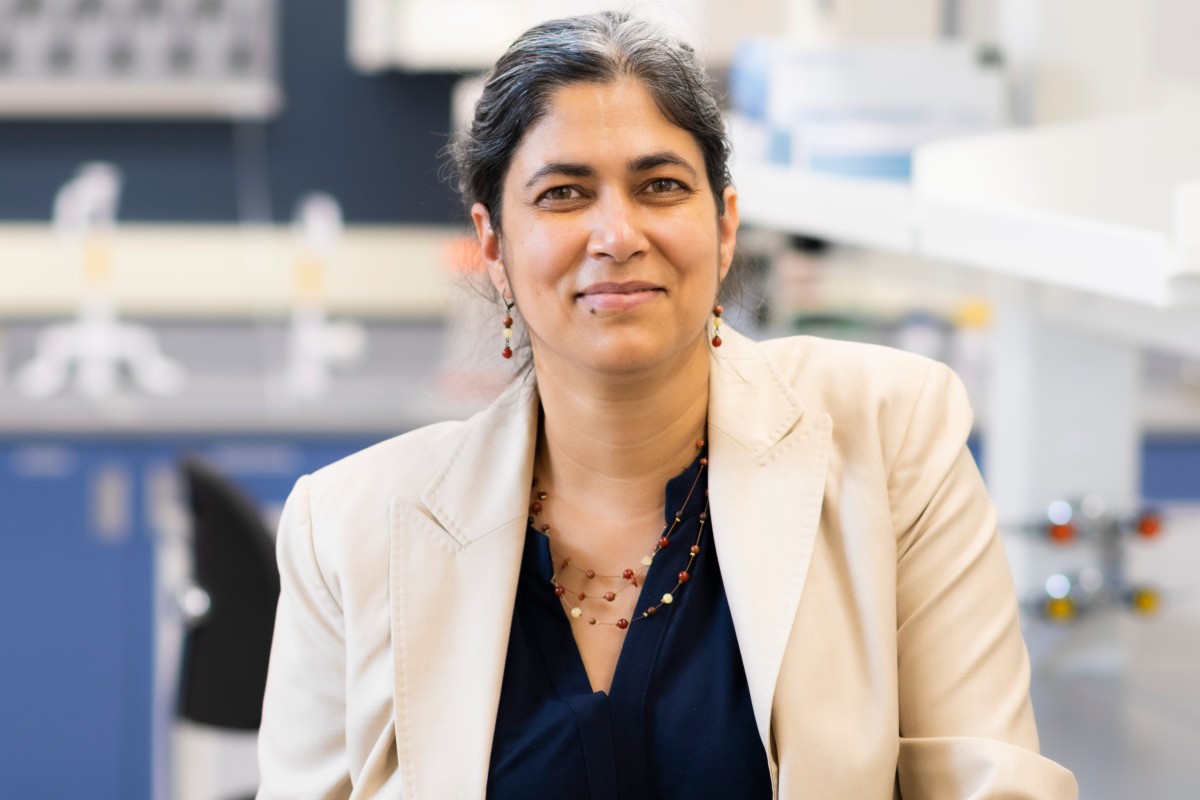
Lara Mahal, professor in the Department of Chemistry and Canada Excellence Research Chair. Photo credit: John Ulan
The study of glycomics has the potential to play a major role in human health, from cancer to microbial infections. Every cell in your body is coated in sugar. In fact, chains of sugar called glycans are the most abundant biomolecule on the planet and a fundamental building block of the human body and the world around us. And understanding the role of these sugars in human health may be the key to unlocking the world of next-generation pharmaceuticals and personalized medicine.
For more than 15 years, Lara Mahal (chemistry) has led the pack in the field of glycomics. And in 2019, Mahal joined the ranks of glycomics experts at GlycoNet, a pan-Canadian Network of Centres of Excellence centred at the University of Alberta, bringing with her $20 million in research funding.
Mahal is the newest Canada Excellence Research Chair (CERC) in the Faculty of Science, a title that brings with it $10 million in federal funding and a matching $10 million from the Government of Alberta. The CERC program is designed to support world‑renowned researchers and their teams to establish ambitious research programs at Canadian universities.
"Canada, and UAlberta in particular, have a rich history of supporting research into carbohydrates—including federal support for GlycoNet," says Mahal, formerly a professor at New York University. "As a result of that investment, Canadian glycomics research is well-known internationally, making it a welcoming place for my science and for us to continue to advance this field at a world-class stage."
How sugar research helps health
The work at GlycoNet and in Mahal's lab aims to improve our understanding of how sugars interact with human health and disease, looking at small-scale chemistry in the human body to make big impacts.
"Glycans, the sugars on proteins and lipids, are involved in the pathogenesis of every major disease—and yet they are one of the least-studied and least understood classes of biomolecules," explains Mahal. "The CERC funding enables us to expand our studies in glycosylation to encompass more clinical collaboration."
Mahal explains that her work at UAlberta will focus on identifying sugars involved in diseases critical to human health—from pancreatic cancer to HIV to COVID-19—and exploring offshoots of her earlier work, which may hold the key to more rapid discovery of druggable targets in disease.
Storied history
The University of Alberta has an impressive record of glycomics expertise, from Raymond (Sugar Ray) Lemieux, (’43 BSc Hons, ’91 DSc), to David Bundle (chemistry). Beginning in the early 1950s, Lemieux and his colleagues were the first to synthesize sucrose, which paved the way for the creation of new antibiotics and blood reagents. Bundle was part of the UAlberta team headed by Lemieux that developed the first synthetic blood-group antigens in the early 1970s.
"UAlberta is known for its concentration in glycosylation researchers,” says Mahal. “There's an exciting group of researchers at this institution in this field I'm looking forward to working with them. I think that this will open up great new opportunities for synergy to help advance this important field."
Taste of our own medicine
Lara Mahal joins a group of innovative researchers in the Department of Chemistry whose cutting-edge glycomics research is shaping the future of health and health care:
- Chris Cairo and his research team are working to develop tools that block an enzyme family linked to human disease—their findings are being used to develop new therapies for cancer and inflammation.
- Ratmir Derda is applying modern chemical biology techniques to problems in carbohydrate science and drug discovery. His spinoff company, 48Hour Discovery, uses this technology to sift through billions of molecules at once, revolutionizing the scientific approach to molecular discovery.
- John Klassen is using the power of mass spectrometry to help formula producers emulate the natural benefits of breast milk through his work building a library screen facility for human milk oligosaccharides.
- Todd Lowary recently helped to develop a urine test that can detect tuberculosis in people living with HIV. Tuberculosis is the most common cause of death for those with HIV. The test will improve the speed and accuracy of diagnosis, providing earlier treatment and improving health outcomes.
- Matthew Macauley’s research sits at the interface between chemistry and immunology. He examines how carbohydrates fine-tune antibody responses, an aspect critical for not only protection from all kinds of pathogens but also essential for understanding how autoimmunity arises.
- Warren Wakarchuk’s research program looks at the biochemistry behind how organisms add sophisticated signalling molecules known as glycans to individual molecules or whole cell surfaces. He strives to improve protein-based pharmaceuticals used in treatments for many diseases, including cancer.